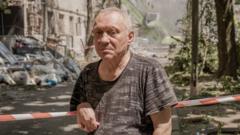This year's St. Petersburg International Economic Forum starkly contrasts with its glorious past, now embodying Russia's isolation following the invasion of Ukraine in 2022. Once a thriving hub of multibillion-dollar investments featuring global brands, the forum has become a stage for lesser-known acts and nations.
No Glitz, Just Grit: St. Petersburg Forum Reflects Russia’s New Reality

No Glitz, Just Grit: St. Petersburg Forum Reflects Russia’s New Reality
As tensions from the Ukraine conflict persist, the St. Petersburg International Economic Forum reveals a stark shift in Russia's economic landscape and global relations.
The essence of the St. Petersburg International Economic Forum has transformed as the event opened on Wednesday, continuing until Saturday. In previous years, the forum was a prestigious occasion where President Vladimir Putin showcased Russia's burgeoning role as a nexus for Western business interests. Notable figures like Emmanuel Macron attended, and multibillion-dollar energy deals were commonplace.
This year's gathering, however, mirrors a different reality. The attendance of the Kingdom of Bahrain as the guest of honor speaks volumes about a stark pivot in alliances, and the selection of the Chinese automobile brand Tank instead of premium names like Mercedes emphasizes Russia's distancing from the West. A delegation from the Taliban now roams the exhibition hall, supplanting the corporate giants that once dominated.
The entertainment has also shifted; an array of lesser-known Russian artists has replaced the international stars of previous years, signaling a stark decline in Russia's allure to global audiences. In light of these changes, the forum underscores the Kremlin's message: a newfound independence from Western dependencies is Russia's trajectory.
Despite some signs of thawing relations, including communications between Putin and former President Trump, major U.S. investors have opted out of this year's discussions. The scheduled Russian-American session, framed around "identifying shared interests," remains exclusive, revealing the widening cracks in international partnerships.
This year's gathering, however, mirrors a different reality. The attendance of the Kingdom of Bahrain as the guest of honor speaks volumes about a stark pivot in alliances, and the selection of the Chinese automobile brand Tank instead of premium names like Mercedes emphasizes Russia's distancing from the West. A delegation from the Taliban now roams the exhibition hall, supplanting the corporate giants that once dominated.
The entertainment has also shifted; an array of lesser-known Russian artists has replaced the international stars of previous years, signaling a stark decline in Russia's allure to global audiences. In light of these changes, the forum underscores the Kremlin's message: a newfound independence from Western dependencies is Russia's trajectory.
Despite some signs of thawing relations, including communications between Putin and former President Trump, major U.S. investors have opted out of this year's discussions. The scheduled Russian-American session, framed around "identifying shared interests," remains exclusive, revealing the widening cracks in international partnerships.





















